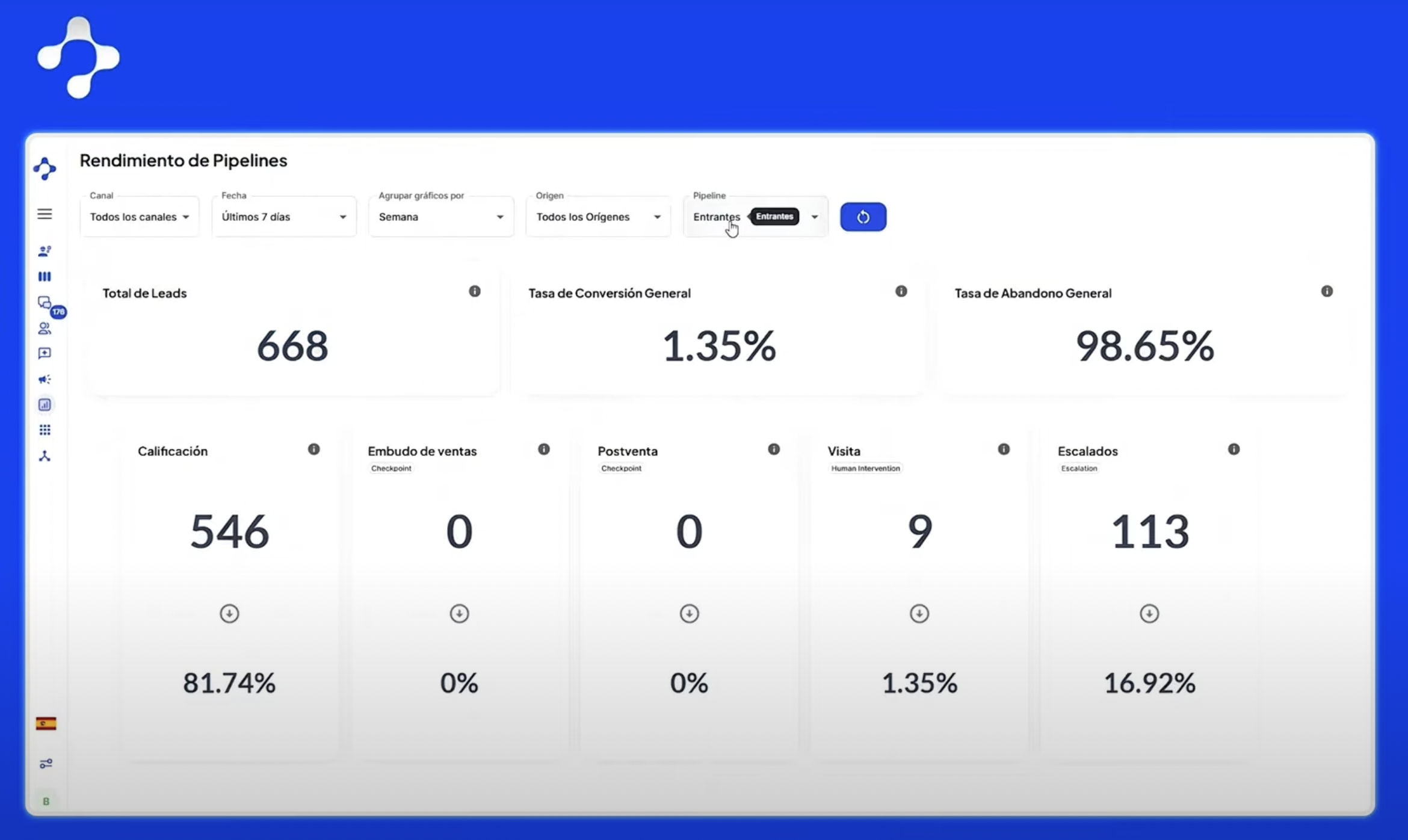The implementation of AI in Latin America can be a major competitive advantage, but it also brings challenges such as limited infrastructure, a lack of skilled labor, and high initial costs.
However, with the right strategies, your company can overcome these barriers and make the most of artificial intelligence's potential

Discover how to make this implementation more efficient and ensure your company is prepared for the future!
The Challenges of Implementing AI in Emerging Markets
Artificial intelligence is revolutionizing the business world, but its implementation in emerging markets presents unique challenges.
While large global companies are rapidly adopting this technology, many businesses in regions like Latin America still face barriers that make AI integration difficult.
Some of the main obstacles include:
📌 Limited Technological Infrastructure
The foundation for AI implementation requires a robust digital infrastructure, including high-speed internet access, processing capacity, and cloud storage.
However, in many emerging markets, these resources are limited or costly, making it difficult to adopt the technology.
💡 Example: Many companies in Latin America still rely on local servers and unstable connections, limiting their ability to run advanced AI models in real time.
👨💻 Lack of Skilled Workforce
AI requires trained professionals in machine learning, data science, and software development. However, emerging markets suffer from a shortage of specialized talent.
Additionally, the brain drain—professionals leaving for other countries in search of better opportunities—makes this challenge even greater.
💡 Example: According to a study by Google for Startups, Box 1824, and Abstartups, only 7% of Brazilian startups claim to have all the necessary skills to grow.
The demand for data scientists and AI/Machine Learning specialists far exceeds the supply of qualified professionals, creating a bottleneck for technology adoption.
💰 High Initial Costs and Uncertain Returns
Implementing AI requires investment in software, hardware, and team training. For many companies in emerging markets, where budgets are tighter, this barrier can prevent technological advancement.
Additionally, the return on investment (ROI) may not be immediate, creating uncertainty about AI's short-term viability.
💡 Example: Small and medium-sized businesses hesitate to adopt AI due to the need for infrastructure investments and the lack of predictability regarding short-term financial benefits.
⚖️ Regulations and Data Privacy
Data protection laws vary by country, and many emerging markets are still defining rules for AI use.
The lack of clear guidelines can create legal uncertainty and hinder technology adoption, especially in industries dealing with sensitive data, such as healthcare and finance.
💡 Example: Some companies refrain from investing in AI due to concerns about violating evolving legislation or uncertainty about best practices for compliance with industry regulations.
Strategies to Overcome Obstacles and Successfully Adopt AI
Implementing artificial intelligence in emerging markets can be challenging, but it is not impossible.
With the right approach, companies can overcome barriers such as limited infrastructure, a lack of skilled labor, and high costs.

Below, we highlight some best practices to ensure a successful AI adoption.
💻 1. Invest in Flexible Digital Infrastructure
The lack of technological infrastructure is one of the main challenges, but cloud-based solutions can help. Platforms like AWS, Google Cloud, and Microsoft Azure allow businesses of any size to use AI without the need for large hardware investments.
💡 Tip: Opting for "pay-as-you-go" services helps reduce costs and enables scalable AI implementation.
🎓 2. Train and Retain Local Talent
The shortage of qualified professionals can be mitigated through internal training and partnerships with universities. Investing in local talent development reduces dependence on foreign professionals and lowers employee turnover.
💡 Example: Initiatives like Oracle Next Education (ONE), which has already trained over 500,000 students in 14 Latin American countries, are essential for developing new talent and reducing the shortage of AI and data science professionals.
💰 3. Gradual Implementation to Reduce Risks and Costs
Adopting AI doesn’t have to be an expensive and risky process. Companies can start with pilot projects and gradually expand as they see results. This allows for adjustments and minimizes waste.
💡 Effective Strategy: Initially implement AI in repetitive tasks (such as customer service or internal process automation) before expanding to more strategic areas.
⚖️ 4. Stay Updated on Local Regulations
Since AI and data privacy laws are still evolving in many countries, companies should stay informed about regulatory changes and adopt best practices in data management. This includes transparency in AI usage and security measures to avoid legal issues.
💡 Tip: Seeking legal advice and following international standards—such as Brazil’s LGPD and data protection regulations in Latin American countries like AAIP in Argentina, INAI in Mexico, and SIC in Colombia—can help mitigate future risks.
The Impact of AI in Latin America: Examples and Growth Opportunities
Artificial intelligence has the potential to drive growth across various sectors in Latin America, making processes more efficient, reducing costs, and creating new business opportunities.
However, AI adoption in the region is still in its early stages, with some companies leading this transformation.
Below, we explore examples of AI’s impact and key growth opportunities in Latin America.
🏠 Real Estate Market: AI Facilitating Property Buying and Renting
Buying and renting properties involve large amounts of data and interactions.
With AI, companies can automate customer preference analysis, offer personalized recommendations, and even predict price trends.
💡 Example: Startups like La Haus, in Colombia and Mexico, use AI algorithms to streamline real estate transactions and connect buyers and sellers more efficiently.
🛒 E-commerce and Retail: Personalization and Automated Customer Service
The digital retail sector has been one of AI’s biggest beneficiaries, enabling personalized offers, smart recommendations, and automated customer support.
Latin American companies are adopting virtual assistants to answer FAQs, process orders, and enhance the shopping experience.
💡 Example: E-commerce giant Mercado Libre uses AI to analyze consumer behavior and suggest products based on purchase history, increasing conversion rates.
🚗 Automotive Sector: AI Enhancing Customer Experience
The automotive industry is adopting AI to improve personalization and optimize customer experience.
In Mexico and Brazil, dealerships are already using smart chatbots to recommend vehicles, simulate financing, and schedule test drives automatically.
💡 Example: GLG Motomex, one of Mexico’s largest motorcycle distributors, used Darwin AI to scale operations and expand into new markets. With AI, the company efficiently responded to leads and increased conversions. Learn more about this success story here.
AI is transforming key sectors of the Latin American economy, creating new opportunities for innovation and efficiency, and its growth potential remains vast.
Outras áreas que também se destacam são:
✅ Agronegócio: Uso de IA para prever safras, otimizar irrigação e reduzir desperdícios.
✅ Saúde: Diagnóstico assistido por IA e automatização de atendimentos.
✅ Educação: Personalização do ensino e aprendizado adaptativo com IA.
✅ Finanças: Detecção de fraudes e automação de processos bancários.
Other standout areas include:
✅ Agribusiness: AI for crop prediction, irrigation optimization, and waste reduction.
✅ Healthcare: AI-assisted diagnostics and automated patient care.
✅ Education: Personalized learning and adaptive teaching with AI.
✅ Finance: Fraud detection and automation of banking processes.
In the next section, we will explore how Darwin AI can help companies in the region overcome barriers and accelerate AI adoption.
How Darwin AI Facilitates AI Adoption in Emerging Markets
Implementing AI in emerging markets can be a major challenge, but accessible and efficient solutions can make all the difference.
Darwin AI is a technology designed to simplify AI adoption, making it scalable and adaptable to the needs of businesses in Latin America.
🚀 Affordable, Ready-to-Use AI
Many companies struggle to adopt AI due to high costs and implementation complexity. With Darwin AI, businesses can integrate artificial intelligence quickly, without requiring large initial investments.
💡 Benefit: Unlike other solutions, Darwin AI enables companies to use AI without needing a highly specialized technical team, making the technology more accessible.
🤖 Smart Automation for Sales and Customer Support
AI-powered process automation improves customer experience and optimizes sales and support teams' performance.
Darwin AI helps businesses automate customer interactions, respond to leads quickly, and reduce response times, ensuring higher conversion rates.
💡 Example: Automotive companies, like GLG Motomex mentioned earlier, are already using Darwin AI to expand operations and increase sales through automated interactions.
Learn more about how AI-powered employees are transforming company sales in this article.
📊 AI That Learns and Adapts to Your Business
One of Darwin AI’s greatest advantages is its continuous learning capability. The technology adapts to each company’s needs, becoming more efficient over time and delivering better results with every interaction.
💡 Key Differentiator: With continuous learning and simplified integration, Darwin AI allows businesses to benefit from AI without undergoing long training processes or manual adjustments.
💡 AI as an Ally for Sustainable Growth
The future of businesses in emerging markets depends on their ability to innovate and scale operations efficiently.
With Darwin AI, companies can accelerate AI adoption, optimize processes, and enhance customer experience without straining their financial structure.
AI as a Growth Engine in Emerging Markets
Throughout this article, we've seen how artificial intelligence is reshaping emerging markets, creating new opportunities, and helping businesses grow.
However, as discussed, its implementation is not simple—challenges like limited infrastructure, a shortage of skilled professionals, and regulatory uncertainties still hinder this transition.
Despite these challenges, strategies such as investing in accessible technologies, training local talent, and gradually adopting AI can help overcome these barriers.
Companies that prepare for this transformation now will gain a competitive advantage in the future

A Darwin AI is already helping businesses accelerate this transformation by offering an accessible and efficient solution to automate processes and enhance customer experience.
🚀 Ready to take your company into the future of artificial intelligence? Discover how Darwin AI can simplify this journey here.
.png)





















